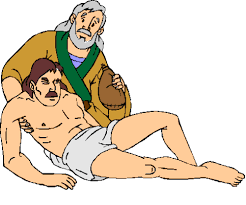 因為有您 一路情義相挺 英文讀書會 得以成長 周年慶聚餐聯誼 來了 還望您繼續相挺
好朋友 8/2星期日 6:30 PM 說吧英文讀書會 將舉辦 周年聚餐聯誼
餐費清潔費共250元 提供自助式晚餐 咖啡飲料無限暢飲
失聯的朋友 老朋友 趕快來聚聚 桌次有限 請跟 Billy 報名繳費 確定座位
每次聚會 除了討論英文主題 大家較少機會聯誼 請好友們踴躍出席支持
(哪位 朋友 能幫忙帶團康活動?) TEL 82581011 請於午後2點後撥
聚餐地點下方 6:30pm 入席
因為有您 一路情義相挺 英文讀書會 得以成長 周年慶聚餐聯誼 來了 還望您繼續相挺
好朋友 8/2星期日 6:30 PM 說吧英文讀書會 將舉辦 周年聚餐聯誼
餐費清潔費共250元 提供自助式晚餐 咖啡飲料無限暢飲
失聯的朋友 老朋友 趕快來聚聚 桌次有限 請跟 Billy 報名繳費 確定座位
每次聚會 除了討論英文主題 大家較少機會聯誼 請好友們踴躍出席支持
(哪位 朋友 能幫忙帶團康活動?) TEL 82581011 請於午後2點後撥
聚餐地點下方 6:30pm 入席
板橋區文化路段421巷11弄1號 (陽光甜味咖啡館)
新埔捷運站1號出口 旁邊7-11巷子進入20公尺 看到夏朵美髮
左轉 聚會時間7:00pm--9:30pm

「好人法」
Good Samaritan law Wikipedia
Good Samaritan laws offer legal protection to people who give reasonable assistance to those who are injured, ill, in peril, or otherwise incapacitated. The protection is intended to reduce bystanders' hesitation to assist, for fear of being sued or prosecuted for unintentional injury or wrongful death. An example of such a law in common-law areas of Canada: a good Samaritan doctrine is a legal principle that prevents a rescuer who has voluntarily helped a victim in distress from being successfully sued for wrongdoing. Its purpose is to keep people from being reluctant to help a stranger in need for fear of legal repercussions should they make some mistake in treatment. By contrast, a duty to rescue law requires people to offer assistance, and holds those who fail to do so liable.
Good Samaritan laws vary from jurisdiction to jurisdiction, as do their interactions with various other legal principles, such as consent, parental rights and the right to refuse treatment. Most such laws do not apply to medical professionals' or career emergency responders' on-the-job conduct, but some extend protection to professional rescuers when they are acting in a volunteer capacity.
The principles contained in good Samaritan laws more typically operate in countries in which the foundation of the legal system is English Common Law, such as Australia. In many countries that use civil law as the foundation for their legal systems, the same legal effect is more typically achieved using a principle of duty to rescue.
Good Samaritan laws take their name from a parable found in the Bible, attributed to Jesus, commonly referred to as the Parable of the Good Samaritan which is contained in Luke 10:25-37. It recounts the aid given by a traveler from the area known as Samaria to another traveler of a conflicting religious and ethnic background who had been beaten and robbed by bandits.
Q:
What do you think about Good Samaritan laws?
How to be a Good Samaritan?
Are you willing helping strangers?
Are you reluctant to help a stranger in need due to fear of getting troubles?
When you do a good deed and expect something in return? Are Good Deeds Rewarded?
Do you believe in Karma? If so, have you truly experienced it?
衝動消費習性
Consumer Behavior-- Reasons We Impulse Buy by Philip Graves
Take a moment to look around your house and you’ll probably find lots of products that you never really use.
The gadgets in your kitchen cupboards, the exercise equipment in your garage, the unworn clothes in your wardrobe: I’m guessing that, if pushed, you could easily explain why they aren’t things you use, but what might have caused you to buy them in the first place?
The fact of the matter is that your unconscious mind is often driving your behaviour as a consumer: under the influence of basic evolutionary drives and the tactics of retailers, it’s easy to feel compelled to buy something that later doesn’t find a place in your life.
Loving Shopping
The simplest explanation is that some people just derive an enormous amount of pleasure from acquiring something new. The act of buying is an act of empowerment that may be felt all too rarely in other aspects of life.
As children, people are often conditioned by their parents to feel good about something new being handed to them. You only need to go back a couple of generations to understand why this was an
understandable sentiment. However, even in these tougher economic times, we can still indulge ourselves (or our kids) far more often and novelty becomes the goal, rather than the signal of something of value being placed in your hands.
Twisted Heuristics
Most shopping is too arduous and time consuming to carry out with conscious attention. Imagine if every item you bought was cross-referenced with every other product available in the market: you would need to look at price, product composition, reviews and maybe even the quality of customer service supporting it. Even if you could find all the information in comparable formats it would take hours to buy one item.
So instead we use heuristics – unconsciously held rules of thumb – that help us make quick decisions that we’ve learned generally work out well.
Retailers take advantage of this by packaging up products as bulk buys, or they include ‘free’ extras. We get the impression that it must be good value, and we go with this feeling rather than researching any further.
Q:
What are the reasons we impulse buying?
Have you ever buy some products that you never really use?
Can shopping make you happier?
What factors influence your buying behaviors? (Ex: TV commercials)
How to attract customers if you were a products supplier?
Do you like luxurious items? Why?
How luxury brands can promote your social status
FOCUS新聞/見人摔倒不敢扶 北京訂「好人法」防誣告
在大陸街頭看到有人摔倒或生病倒地,很少有人敢出面照顧,因為傳出太多「好心沒好報」的案例,幫忙反而遭誣告求償,北京近日就提出制定「好人法」,用法律保障緊急現場的救護行為,除了是保障好人,也希望能重新喚起民眾的善心意識。
監視器截圖畫面,一位老先生騎腳踏車穿越馬路,可能是天雨路滑摔倒了,穿紅色衣服的男學生,趕緊上前幫忙,但老先生的一句話卻讓他傻了。好心學生:「他當時問這是誰家的孩子啊,然後看見有車子過來,就在那裡說開慢點開慢點,別把人撞著了,他說了你撞他了嗎?他說我第二次把他撞了。」
怎麼救人成了凶手,大批民眾圍過來,老先生緊抓著學生堅持不放手。目擊者:「當時上午下了雨,路面是濕的,大爺一開始起來的時候,沒說冤枉那孩子,起初起來的時候他說沒事,然後他起來過了幾分鐘,他就不讓那小孩走。」
目擊者幫忙證明,加上警方調出監視器畫面,這才還給男同學一個公道。好心學生:「你覺得你今後,還會去做這些事情嗎?我覺得會吧,對別人要有愛心,家裡人也是這麼教的,反正到時候肯定就是吃一塹長一智,要多留個心眼,比如拍照之類的取證。」
好心幫忙卻被反咬一口屢見不鮮,北京決定祭出「好人法」,根據北京市院前醫療急救服務條例第38條規定,鼓勵具備醫療急救專業技能的個人,在醫療急救人員到達前,對患者實施緊急現場救護,而救護的行為受到法律保護,雖然還是草案但已引起熱烈回響,因為過去實在太多好心人受了不白之冤。
好心民眾:「我正在走路準備到前面去坐車,那個老太太就這樣摔倒在我面前,我是聽到聲音,然後我就去扶她了,扶她的時候她就身體往我身上倒,腳就往我車子方向移過去,就不起來了,就說是我撞到她的。」
好心被雷劈例子不勝枚舉,情節還被搬上央視春晚。大陸央視春晚節目《扶不扶》:「你是個好孩子,還知道把大媽扶起來,我這做好事上癮,這要換了別人啊,撞完我早跑了。」
看人跌倒扶還是不扶,本來該是反射動作,卻讓人怯步。大陸民眾:「多一事不如少一事,很多人抱著這種心態,我想要看那個時候是什麼情況,如果很多人都選擇離開,我覺得我應該也不會,去參與這件事。」
就怕惹禍上身,日行一善的美德,可能變成給自己找麻煩,事實上在2013年,深圳就率先推出所謂的好人法,對救助人權益加以保障,一旦發生爭議,被救助人必須自己舉證,隨著北京跟進,也引發是否該在大陸一起實施好人法的討論。
大陸主播:「你不用再擔心,被誣陷被冤枉,因為法律替你撐腰。」
深圳大學教授:「我們對施害者,我們相關的條例,應該對他們進行適當的懲罰,只有兩方面結合起來,才能夠真正改變,我們社會的誠信缺失。」
保護善意懲罰惡意,雖然是多數共識,但如何透過法律手段執行,學界法界還有不小分歧,但至少都希望能藉此「扶起正能量」。


















0 意見:
張貼留言